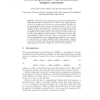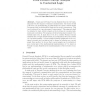379 search results - page 13 / 76 » Probabilistic (logic) programming concepts |
111
click to vote
ICTAI
2007
IEEE
15 years 6 months ago
2007
IEEE
We review a method of generating logical rules, or axioms, from empirical data. This method, using closed set properties of formal concept analysis, has been previously described ...
CSL
1998
Springer
15 years 4 months ago
1998
Springer
We study revision programming, a logic-based mechanism for enforcing constraints on databases. The central concept of this approach is that of a justi ed revision based on a revisi...
101
click to vote
AAAI
2010
15 years 1 months ago
2010
Ontology matching is the problem of determining correspondences between concepts, properties, and individuals of different heterogeneous ontologies. With this paper we present a n...
145
click to vote
FCA
2005
Springer
15 years 5 months ago
2005
Springer
Abstract. A main goal of Formal Concept Analysis from its very beginning has been the support of rational communication. The source of this goal lies in our understanding of mathem...
136
click to vote
TACAS
1998
Springer
15 years 4 months ago
1998
Springer
Relay Ladder Logic (RLL) [4] is a programming language widely used for complex embedded control applications such as manufacturing and amusement park rides. The cost of bugs in RLL...


